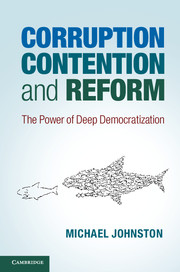Book contents
- Frontmatter
- Dedication
- Contents
- List of Figures
- List of Tables
- Preface
- Acknowledgments
- 1 Reform in an imperfect world
- 2 “Deep democratization” and the control of corruption
- 3 First, do no harm – then, build trust: reform in fragile and post-conflict societies
- 4 Official Moguls: power, protection . . . and profits
- 5 Oligarchs and Clans: high stakes and insecurity
- 6 Elite Cartels: hanging on with a little help from my friends
- 7 Influence Market corruption: wealth and power versus justice
- 8 Staying power: building and sustaining citizen engagement
- Appendix Recognizing the syndromes of corruption
- References
- Index
- References
8 - Staying power: building and sustaining citizen engagement
Published online by Cambridge University Press: 05 June 2014
- Frontmatter
- Dedication
- Contents
- List of Figures
- List of Tables
- Preface
- Acknowledgments
- 1 Reform in an imperfect world
- 2 “Deep democratization” and the control of corruption
- 3 First, do no harm – then, build trust: reform in fragile and post-conflict societies
- 4 Official Moguls: power, protection . . . and profits
- 5 Oligarchs and Clans: high stakes and insecurity
- 6 Elite Cartels: hanging on with a little help from my friends
- 7 Influence Market corruption: wealth and power versus justice
- 8 Staying power: building and sustaining citizen engagement
- Appendix Recognizing the syndromes of corruption
- References
- Index
- References
Summary
I can’t tell just how many of these movements I’ve seen started in New York during my forty years in politics, but I can tell you how many have lasted more than a few years – none . . . They were mornin’ glories – looked lovely in the mornin’ and withered up in a short time, while the regular machines went on flourishin’ forever, like fine old oaks.
– George Washington PlunkittKeeping up the pressure
One day not long after the turn of the twentieth century George Washington Plunkitt, former New York State Senator and a Sachem of Tammany Hall, sat on the bootblack stand in the New York County Courthouse and delivered that assessment of reformers (Riordon 1963: 21). Deep democratization and strong political foundations for reform require citizen participation, but Plunkitt’s observations remain all too true, even in a time of heightened consciousness about corruption. Collective-action problems; material need, and often the prospect of losing even petty corrupt benefits; low levels of trust among citizens, in government, and in reformers themselves; threats and intimidation by the powerful; and the sheer amount of effort and sacrifice involved in checking corruption all make citizen involvement in reform difficult to sustain. The scenario can be depressingly familiar: anti-corruption efforts debut with great fanfare and high-minded appeals, attract an initial surge of citizen and news media interest, and then gradually descend into apathy, division, or cynicism. The last several years have featured numerous examples of citizen action against corruption that drew widespread support at first, yet gradually ebbed: consider Anna Hazare’s series of hunger strikes in India, in 2011 and 2012, and his initially huge mass movement that dwindled in size and enthusiasm as time went by (Guardian 2012). Greater pluralism and safe political space – or more focused anti-corruption activism and demands for accountability – mean little without strong and sustained citizen involvement. How can an active citizen presence be sustained?
- Type
- Chapter
- Information
- Corruption, Contention, and ReformThe Power of Deep Democratization, pp. 220 - 240Publisher: Cambridge University PressPrint publication year: 2013



